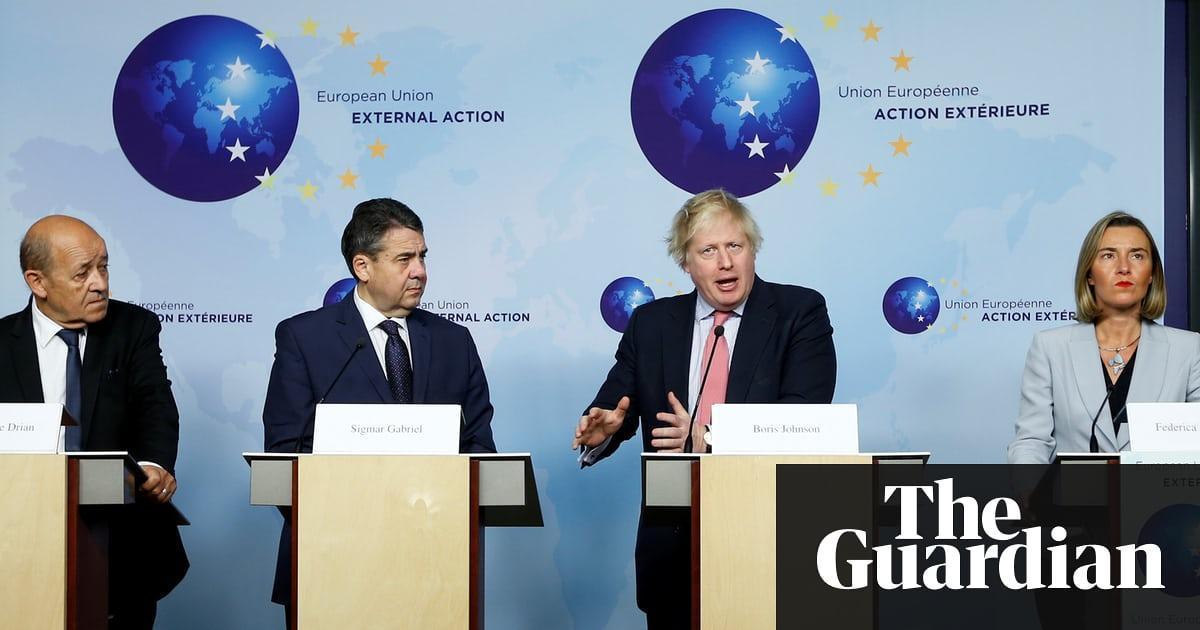
Iran’s foreign minister will meet his British, French and German counterparts in Brussels on May 15 to discuss US President Donald Trump’s withdrawal from the nuclear deal with Tehran, the EU said.
European Union foreign policy chief Federica Mogherini will host the talks between the so-called E3 powers and Iranian minister Mohammad Javad Zarif, her office said in a statement.
Mogherini said shortly after Trump’s announcement on May 8 that the EU is “determined to preserve” the deal, while EU leaders are set to discuss the issue at a summit in Bulgaria next week.
Mogherini “will on Tuesday 15 May in Brussels host a meeting with E3 Foreign Ministers (Germany, France, UK). This EU/E3 meeting will then be followed by a meeting of that same group with the Foreign Minister of Iran, Mohammad Javad Zarif,” the EU statement said.
Germany, France and Britain want talks to be held in a broader format on Iran’s ballistic missile program and its regional military activities, including in Syria and Yemen.
“The extent to which we can keep this deal alive ...is something we need to discuss with Iran,” said German Chancelor Angela Merkel, who earlier spoke with Russian President Vladimir Putin on the issue.
Divisions in Iran over what should happen next were illustrated as senior cleric Ayatollah Ahmad Khatami told worshippers at Tehran University on Friday that European nations could not be trusted.
President Hassan Rouhani had said on May 8 that Tehran would remain in the deal, provided its benefits stayed in force under its remaining signatories.
Iran’s foreign minister will travel to Moscow on May 14 and meet his Russian counterpart, Russia’s RIA news agency said, citing a Russian foreign ministry official.
Iran said it had asked Europe’s Airbus to announce whether it would go ahead with a plane deal with Tehran following the U.S. pullout.
That appears unlikely after U.S. Treasury Secretary Steven Mnuchin said on May 8 that licenses for the plane maker and rival Boeing Co to sell passenger jets to Iran would be revoked.
France’s Finance Minister Bruno Le Maire said Paris was seeking U.S. waivers and longer transition periods over Iran for French companies including Renault and Total, while pressing for European Union measures to improve the bloc’s “economic sovereignty” in the longer term.
“It’s time that European countries opened their eyes,” Le Maire said on Europe 1 radio.
French exports to Iran doubled to 1.5 billion euros ($1.79 billion) last year, driven by jets and aircraft and automobile parts, according to customs data.
Exports of German goods to Iran rose by around 400 million euros to 3 billion euros. Around 120 German firms have operations with their own staff in Iran, including Siemens , and some 10,000 German companies trade with Iran.
“We are ready to talk to all the companies concerned about what we can do to minimize the negative consequences,” Altmaier told Deutschlandfunk radio. “That means, it is concretely about damage limitation”.
But the U.S. ambassador in Berlin, Richard Grenell, said firms should question the morality of doing business with Iran.
“Germany, France and Britain, the ‘EU3’, say themselves that Iran poses a threat. Do they want to do business with a threat?” Grenell told Bild newspaper.
Altmaier said Germany wanted to avoid “a spiral of escalation” in transatlantic trade relations.
Merkel was more blunt.
“If everybody does what they like, then this is bad news for the world...,” Merkel said during a church event in the western German city of Münster.